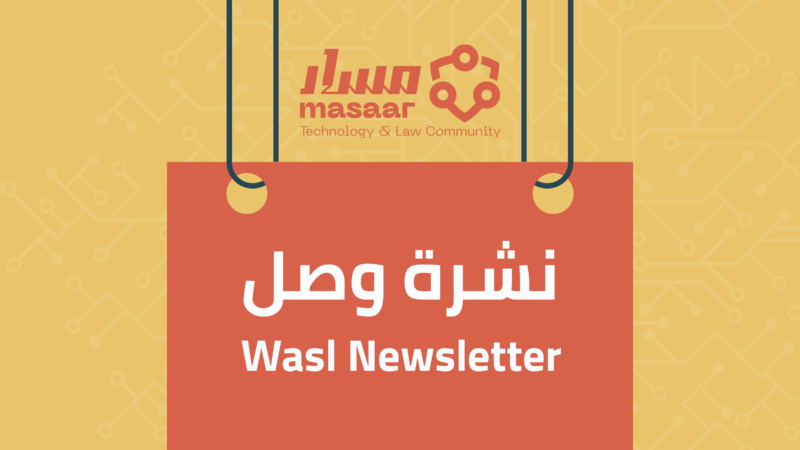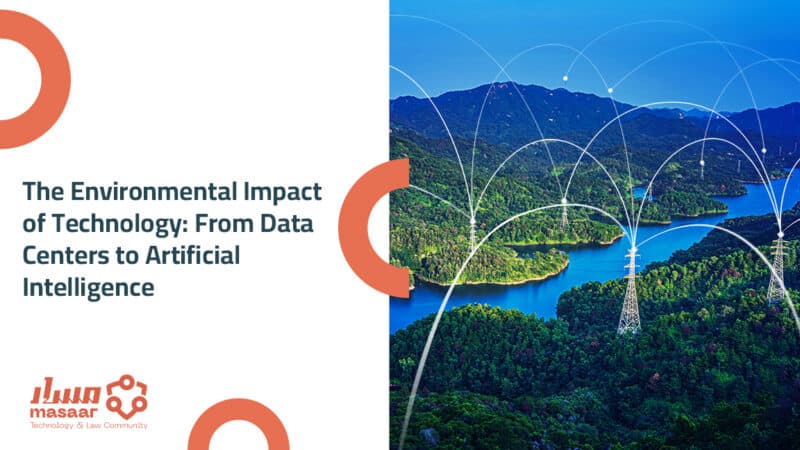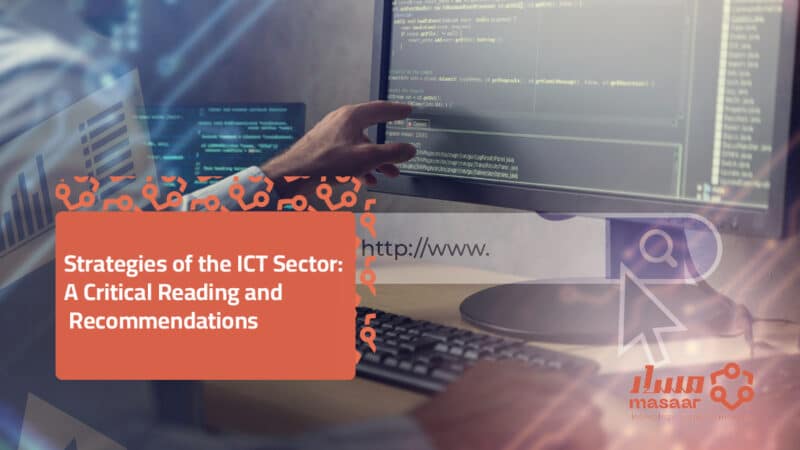“Wasl” Newsletter: Issue 13

Masaar – Technology And Law Community Activities
Tech and Law
A Study on the Prohibition of Using Communication Tools as Precautionary Measures in Egyptian Law
This paper discusses prohibiting the use of communication tools or preventing their possession or acquisition as precautionary measures in Egyptian law. The paper also addresses the impact of this measure on fundamental rights, foremost among them the right to freedom of expression. Arabic
Explanatory Memorandum: Absence of Insurance Coverage for Platform Economy Workers
This explanatory memorandum addresses the legal issue of the absence of insurance coverage for platform economy workers in light of the new Social Insurance and Pensions Law. It provides an overview of the general legal context and analyzes the reasons why many freelancers are not subject to the law’s provisions, with a focus on workers in digital service platforms. English | Arabic

Between Reality and Legislation: Issues with the Law Regulating the Technologists Syndicate
This paper offers a critical analysis of the law establishing a professional syndicate for technologists. It explains the need for such a syndicate and regulatory framework for technological professions, reviews the law’s structure, philosophy, and key provisions, and critiques its main issues. English | Arabic
Tech and Equality
Progressive Communications as a Tool for Advancing Gender Equality
This paper provides an overview of the intersection between progressive communications and gender. It discusses progressive communications’ role in supporting efforts to achieve gender equality, including the opportunities available and the means to support them. English | Arabic

Human Rights and Business
The Impact of Digital Transformation on Economic and Social Rights
This paper discusses the impact of digital transformation on economic and social rights. It focuses on three main rights: the right to education, the right to work, and the right to healthcare. For each of these rights, the paper examines the potential of digital transformation to address the challenges of providing them and the possible negative effects of digital transformation. English | Arabic
Platform Economy: The Future of Work in the Digital Age
This paper examines various issues related to the platform economy while focusing on the Egyptian context. The paper highlights key players, analyzes growth factors, and addresses associated challenges. English | Arabic

How Big Data Can Improve the Efficiency of the Service Sector in Egypt
This paper discusses various aspects of the potential optimal utilization of big data in the Egyptian context. It explores the prospects of this utilization in both the government sector and the private sector. The paper also addresses the concerns and threats to consider when harnessing big data. English | Arabic
The Environmental Impact of Technology: From Data Centers to Artificial Intelligence
This paper addresses the key features of digital technology’s environmental impact, illustrated with relevant examples. The first section discusses the environmental impact of digital technology, focusing on carbon emissions, electronic waste, and hidden costs. The second section proposes solutions at the national, industry, and individual levels to mitigate these impacts. English | Arabic

Digital Transformation and Social Justice: The Impact of Digital Technology on Income Distribution
This paper examines digital technology’s complex and multifaceted impact on poverty and income inequality. It highlights that this impact is not inherently positive and depends heavily on policy frameworks. The paper aims to provide a balanced picture of the positive and negative aspects of digital technology’s impact on poverty and income distribution. English | Arabic
Internet Governance
Towards a More Equitable Digital Future: Data Justice and Human Rights Principles
This paper investigates the potential of integrating data justice principles with digital and human rights frameworks. It examines how this integration can facilitate the identification of biases based on ethnicity and gender within digital environments. By exploring this intersection, the paper aims to promote a more just and equitable digital future. English | Arabic
Strategies of the ICT Sector: A Critical Reading and Recommendations
This paper critically examines several strategies related to the ICT sector. It addresses the extent to which these strategies are concerned with guaranteeing citizens’ exercise of the right to privacy, the right to access information and the right to freedom of expression. English | Arabic

Artificial Intelligence
The EU AI Act: Objectives, Structure, and Key Provisions
This paper discusses the EU AI Act’s objectives, structure, and most important characteristics. It also deals with the general and special requirements applicable to AI systems. Finally, the paper sheds light on the Act’s most important provisions and the institutions it establishes. English | Arabic
New on “CONNECT” Podcast (Arabic Audio)
- Episode (17): The Environmental Impact of Technology
Find the podcast at Youtube Music | Apple Podcasts | Spotify

From the Arab Region
Surveillance Watch: Interactive Map
Surveillance Watch is an interactive map that aims to reveal the hidden connections within the surveillance industry. By mapping out the relationships between surveillance companies, their subsidiaries, partners, and investors, Surveillance Watch seeks to shed light on the complex network that enables the surveillance industry and its harmful practices and human rights violations.
Check the map via Surveillance Watch
SMEX | South Lebanon: “We are at risk of being disconnected from the world”
For months, residents of South Lebanon have been facing challenges maintaining communication networks as a result of Israeli airstrikes. This report from SMEX covers how the residents have been left without internet and phone services for months and why repairs are not being made. English | Arabic
7amleh | The War on Gaza: An Analytical Reading of the Consequences and Impacts on Digital Safety among Palestinian Yout
This position paper from 7amleh offers an analytical review of the potential effects of digital violations led by Israel, which have eroded the sense of security among Palestinian youth, while also reflecting on the stance of human rights organizations on the issue. English | Arabic
